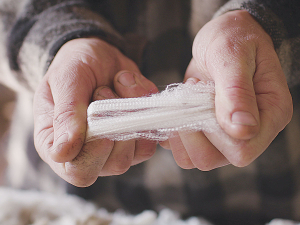Top wool advocate bales out
The conversion of productive farmland into trees has pretty much annihilated the wool industry.
 Merino outdoor brand, Devold, recently donated 500 merino blankets to the trust and, as Devold New Zealand general manager Craig Smith says the support was an obvious fit.
Merino outdoor brand, Devold, recently donated 500 merino blankets to the trust and, as Devold New Zealand general manager Craig Smith says the support was an obvious fit.
Wool could be the secret to keeping premature babies safe and warm, says Little Miracles Trust chief executive Rachel Friend.
The Little Miracles Trust is a not-for profit which provides support for families who are going through a neonatal intensive care experience with their babies.
“Natural fibres are best, in particular wool and in particular merino wool, to keep them warm when they have so little fat,” she says.
Merino outdoor brand, Devold, recently donated 500 merino blankets to the trust and, as Devold New Zealand general manager Craig Smith says the support was an obvious fit.
“Premature babies need to be looked after, and wool is the product to do that,” says Smith. “It’s nature helping nature. It really is the best material for the job.”
He says the partnership was a natural fit for Devold.
“It’s something pretty special that we can do, providing blankets from our own mill in Lithuania and made with fine merino from New Zealand,” he says. “We’re proud to clothe athletes at the top end and little premature babies when they come into the world.”
Friend says the donation has the potential to be a game-changer for babies and their families, both to give the little ones access to the best materials early on in life, as well as to promote merino over fabrics like polar fleece, which can be harmful.
“For these tiny babies, part of their journey in hospital is putting on fat and gaining the ability to regulate their body temperatures,” Friend explains.
“Merino is a natural fibre, so it lets their skin breathe unlike polar fleece, and they won’t overheat and risk a chill,” she says. “That’s why it works year-round as well.”
She says that 10% of Kiwi families will go through an experience with intensive neonatal care at some point.
She came across Devold at a merino wool conference, and with winter coming, reached out to Smith.
“We’re pretty desperate for it,” she says. “Actually trying to get the merino cloth itself is really difficult and can be quite cost prohibitive as well. They’ve been able to deliver the goods which I’m so excited about.”
“I just want to say a huge thanks to Devold for stepping up and being there,” Friend says. “For them to be doing this makes a massive difference. It’s the most vulnerable babies in our country who will benefit, and a huge proportion of the families who will go through this experience are from low socioeconomic areas and this will benefit them hugely, too.”
Applications are now open for the 2026 NZI Rural Women Business Awards, set to be held at Parliament on 23 July.
Ravensdown has announced a collaboration with Kiwi icon, Footrot Flats in an effort to bring humour, heart, and connection to the forefront of the farming sector.
Forest & Bird's Kiwi Conservation Club is inviting New Zealanders of all ages to embrace the outdoors with its Summer Adventure Challenges.
Grace Su, a recent optometry graduate from the University of Auckland, is moving to Tauranga to start work in a practice where she worked while participating in the university's Rural Health Interprofessional Programme (RHIP).
Two farmers and two farming companies were recently convicted and fined a total of $108,000 for environmental offending.
According to Ravensdown's most recent Market Outlook report, a combination of geopolitical movements and volatile market responses are impacting the global fertiliser landscape.